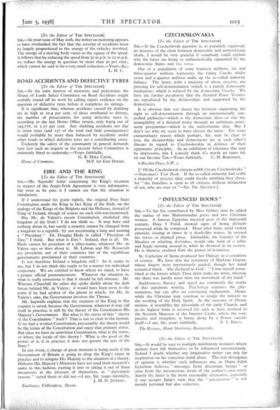CZECHOSLOVAKIA
[To the Editor of THE SPECTATOR] SIR,—If the Czechoslovak question is, as popularly supposed, an instance of the clash between democratic and authoritarian ideals, I would be very grateful if somebody could explain why the latter are being so enthusiastically supported by the democratic States and vice versa.
Out of a population of some fourteen millions, six and three-quarter millions represents the ruling Czechs whilst seven and a quarter millions make up the so-called minority balance. The latter, with a majority of about 5oo,000, are pressing for self-determination (which is a purely democratic institution), which is refused by the democratic Czechs. We have the further peculiarity that the dictated Peace Treaties are repudiated by the dictatorships and supported by the democracies. •
It is obvious that our choice lies between supporting the right to self-determination through an internationally con- trolled plebiscite—which is the democratic idea—or else the intangibility of a dictated treaty through an ambitious arma- ment programme—which is the authoritarian idea. But I don't see why we seem to have chosen the latter. For some extraordinary reason which perhaps, Sir, may be clear to you, the dictatorships and democracies are at each other's throats in regard to Czechoslovakia in defence of their opponents' principles. As an exhibition of tolerance this may be impressive, but I scarcely think it's worth an extra 6d.
on our Income Tax.—Yours faithfully, C. H. ROBINSON.
6 Brechin Place, S.W. 7.
[" Of the Czechoslovak citizens 9,688,770 are Czechoslovaks." —Statesman's Year Book. If the so-called minority had really a majority of 5oo,000 they could decide anything they chose, for " the franchise is open to all citizens, without distinction of sex, who are over 21."—ED. The Spectator.]


















































 Previous page
Previous page